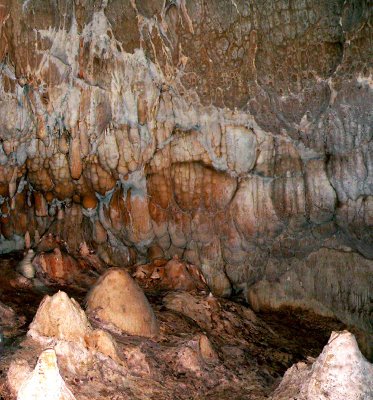
Ballica Magarasi (Ballica Cave) is located high on the slopes of Mount Akdag (1,915m asl). The location is rather remote, and so it never was a popular vacation spot. The cave is known since Roman times.
Ballica Cave is located in a small patch of marble, unbedded but faulted and fractured. The tectonic cracks are filled with calcite. Beneath the cave there are other karst features like dolines and swallow holes in the area.
The cave has two floors. The main direction of the first is northeast-soutwest. This passage is more or less horizontal showing a wealth of stalactites, stalagmites, columns, flowstones, draperies, soda straws, dripstones, pools, and cave pearls. The second floor is orientated northwest-southeast and is going down continually, following fractures in the rock. Having also many beautiful speleothems, it also contains an extraordinary 6.5m long stalactite, which is one of the longest in Europe. There is no corresponding stalagmite under this stalactite.
Rather unusual is the high influence of tectonic movements, earthquakes, on the cave development. Fallen blocks on the floor of the cave are interpreted as debris of regional earthquakes. Thick columns show horizontal fractures, and there are numerous stalagmite-free stalactites in the lower part of the Yeni Saloon.
Ballica Cave is located in a small patch of marble, unbedded but faulted and fractured. The tectonic cracks are filled with calcite. Beneath the cave there are other karst features like dolines and swallow holes in the area.
The cave has two floors. The main direction of the first is northeast-soutwest. This passage is more or less horizontal showing a wealth of stalactites, stalagmites, columns, flowstones, draperies, soda straws, dripstones, pools, and cave pearls. The second floor is orientated northwest-southeast and is going down continually, following fractures in the rock. Having also many beautiful speleothems, it also contains an extraordinary 6.5m long stalactite, which is one of the longest in Europe. There is no corresponding stalagmite under this stalactite.
Rather unusual is the high influence of tectonic movements, earthquakes, on the cave development. Fallen blocks on the floor of the cave are interpreted as debris of regional earthquakes. Thick columns show horizontal fractures, and there are numerous stalagmite-free stalactites in the lower part of the Yeni Saloon.
You have read this article Beautiful Locations
with the title Ballica Cave. You can bookmark this page URL https://lettersfromladygodiva.blogspot.com/2006/09/ballica-cave.html?m=0. Thanks!



